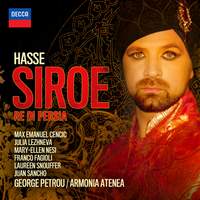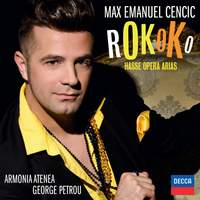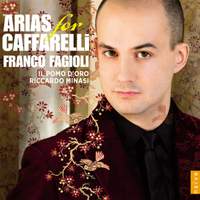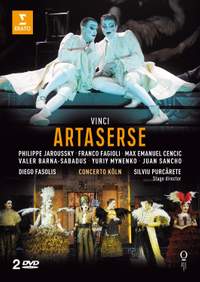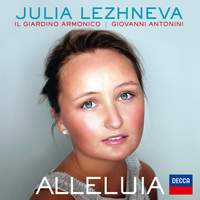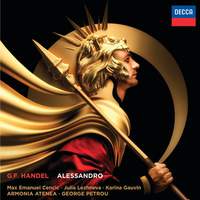Interview,
Max Cencic on Hasse's Il Siroe Re di Persia
 Shortly before Christmas I spent a newsletter singing the praises of Armonia Atenea, Parnassus Arts and Max Emanuel Cencic for carrying out one of the most vital and spirited bits of musical excavation of 2014 - the first-ever recording of Johann Adolf Hasse's Siroe Re di Persia, featuring singing from Franco Fagioli, Julia Lezhneva, and Cencic himself in the title-role as the put-upon monarch-in-waiting. Since then, Siroe's featured as a Gramophone Editor's Choice and a Presto Disc of the Year, as well as in Building A Library's Opera Round-Up, which will be broadcast just as this article goes to press - I threw a few questions about the project at Max himself just before we all packed up for the Christmas break, and now seems a pertinent time to share his responses...!
Shortly before Christmas I spent a newsletter singing the praises of Armonia Atenea, Parnassus Arts and Max Emanuel Cencic for carrying out one of the most vital and spirited bits of musical excavation of 2014 - the first-ever recording of Johann Adolf Hasse's Siroe Re di Persia, featuring singing from Franco Fagioli, Julia Lezhneva, and Cencic himself in the title-role as the put-upon monarch-in-waiting. Since then, Siroe's featured as a Gramophone Editor's Choice and a Presto Disc of the Year, as well as in Building A Library's Opera Round-Up, which will be broadcast just as this article goes to press - I threw a few questions about the project at Max himself just before we all packed up for the Christmas break, and now seems a pertinent time to share his responses...!
How did you come across this work in the first place?
Over the past few years I'd become very interested in music written between 1740 and 1770, and thanks to a specialist team of researchers we unearthed Siroe, which seemed to me to be the most important of Hasse’s operas, effectively condensing Hasse’s operatic career.
Why the Dresden Siroe (from 1763)? Does it show a more radical Hasse than the Bologna version from 1733?
The Dresden version is certainly far more mature and interesting dramatically, not least because it was less of a ‘circus’ built around star singers (Caffarelli and Farinelli had both sung in the Bologna version, but of course we don’t know what they even sounded like by then!). Hasse was most definitely drawing on ideas about opera reform by this stage in his career, though not necessarily in quite the same way as Gluck; however, political pressures (the situation at the Dresden court at the time was volatile because of the war in Saxony), plus Hasse’s own ill health, meant that he didn't manage to revise the entire score and ended up retaining the last third of the opera from Bologna.
Were there any decisions to be made regarding cuts and/or insertion-arias?
We actually recorded the entirety of the Dresden version, with the exception of a couple of recitatives which we pruned – we even added two arias (for Laodice and Siroe).
What attracted you to the title-role, rather than that of the scheming Medarse (who has the more virtuosic music)?
I always wanted to sing the role of Siroe because [Pasquale] Bruscolini (the Italian soprano castrato who sang the part at the Dresden premiere] is kind of a spirit-animal for me - our voices seem to sit in exactly the same place!
Hasse was one of the most celebrated composers of his day, but until recently has been little more than a footnote in the musical history-books: why do you think his music is only just coming to prominence again now?
Even more than other baroque music, Hasse’s operas make the most extreme vocal demands – extreme coloratura ability as well as extreme highs and extreme lows - to the extent that you need three Julia Lehznevas and five Franco Fagiolis to do them justice!
So what's next, both in terms of solo recital discs and complete opera recordings?
I've got a solo album of the arias from the Neapolitan School coming up in the spring; then complete recordings of Vinci’s Catone in Utica, Pergolesi's Adriano in Siria and two further Handel operas - Radamisto and Arminio.
Il Siroe Re di Persia is out now on Decca Classics and is an Editor's Choice in this month's Gramophone.
Available Formats: MP3, FLAC, Hi-Res FLAC
Related recordings by these artists
Cencic and Petrou started flying the flag for Hasse in February with this barnstorming collection of operatic arias - including Siroe's great lament 'La sorte mia tiranna' - described by International Record Review as 'a worthy introduction to Cencic's abilities for anyone who has yet to make his acquaintance and are confirmation for his admirers, should they need it.'
Available Formats: MP3, FLAC, Hi-Res FLAC
Franco Fagioli includes two of Medarse's arias (and music by Manna, Porpora, Vinci and Pergolesi) on this breathtaking recital of music written for the brilliant but temperamental castrato Caffarelli, described as 'jaw-dropping' (The Guardian), 'astonishing' (Gramophone) and 'outstanding' (The Independent).
Available Formats: MP3, FLAC, Hi-Res FLAC
With lavish baroque costumes and postmodern sets by Helmut Stürmer, this DVD of the production was filmed live at the Opéra National de Lorraine in 2012 with much the same cast as the studio recording.
Available Format: 2 DVD Videos
Young Russian soprano Julia Lezhneva displays her crystalline coloratura, pearly tone and sheer joie de vivre on this collection of celebratory motets by Handel, Porpora, Vivaldi and Mozart, her debut solo disc on Decca. Giovanni Antonini directs Il Giardino Armonico.
Available Formats: MP3, FLAC, Hi-Res FLAC
Several of the Siroe team (Armonia Atenea, George Petrou, Juan Sancho, Julia Lezhneva and Max Cencic) collaborate on this 2012 recording.
Available Formats: MP3, FLAC


